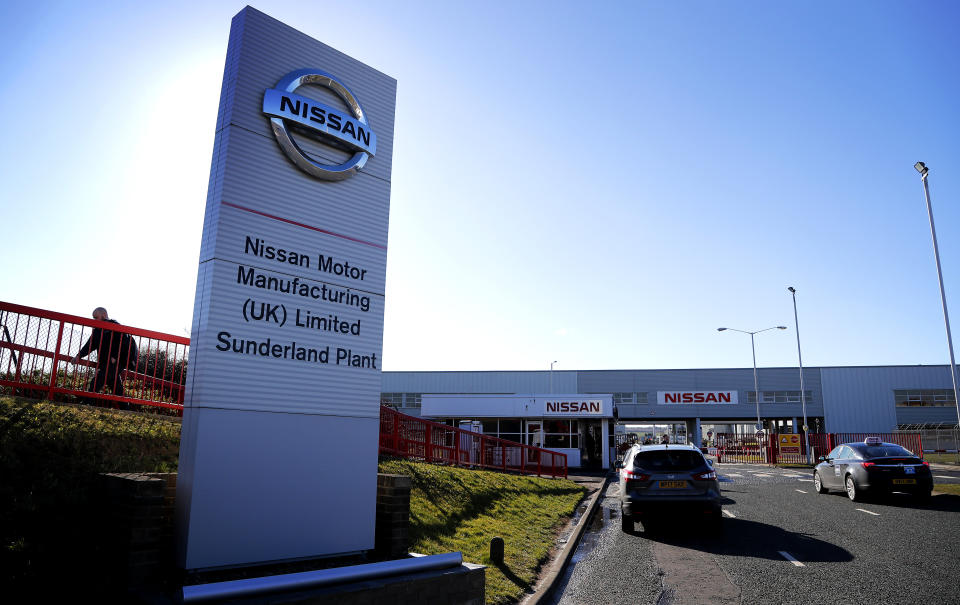Nissan confirms 12,500 jobs to go worldwide amid fears for Sunderland plant

Nissan plans to axe around 12,500 jobs worldwide in a huge cost-cutting drive, more than doubling the number of previously announced job losses as the car maker saw its profits almost wiped out.
Shares of the Japanese car giant (NSANY) shares fell 2% in Tokyo as Nissan said it will cut its product lineup by 10% “to improve product competitiveness” amid sluggish sales.
The 12,500 job cuts announced Thursday include the 4,800 announced in 2018. This could lead to a nearly 10% reduction in Nissan’s worldwide workforce.
The move will spark fears for the future of workers at its Sunderland plant. There is no indication yet where the axe will fall, but any further job losses in Sunderland would come as a huge blow to the city in northeast England, where Nissan is a major local employer.
The Nissan plant in Sunderland employs around 6,700 people, supporting an estimated 27,000 more in its supply chain largely across the north-east.
The UK government promised the company up to £80m of support after the EU referendum, which saw Sunderland vote Leave but sparked alarm at Nissan over disruption to trade with Europe.
READ MORE: Honda’s decision to leave the UK reflects the age of the electric car
The carmaker said on Thursday its operating profit was down 98.5% to 1.6bn yen (£11.9m) in the year to 30 June, with revenues down 12.7% and its net income down 94.5%.
Analysts expected poor results, with a slowdown in global demand for passenger cars and Nissan blaming rising raw material costs, currency movements, and higher investments to “meet regulatory standards.”
Nissan and other carmakers have previously warned global trade tensions are increasing costs of key materials like aluminium, while they have also had to spend heavily to meet strict new EU emissions rules and avoid fines.
Nissan is still trying to recover from a scandal surrounding ousted chairman Carlos Ghosn.
The company’s sales dropped by 16.3% in Europe including Russia, and fell in Japan by 2.6% but increased 2.3% in China.
One source with knowledge of the Sunderland plant played down fears for its survival, telling Yahoo Finance UK they did not expect any further cutbacks beyond the several hundred job losses announced last year.
This sources also pointed out the next-generation QashQai and Juke models are due to be built at the site.
Sunderland made headlines as it voted strongly for Brexit in one of the bellwether results that was among the first to declare during the EU referendum, despite Nissan’s close ties to Europe.
The Sunderland plant has previously been described as the most productive car plant in Britain, with around one in three British cars made by Nissan and exports to more than 130 countries around the world.
READ MORE: Hammond deliver’s loaded warning to Johnson in resignation letter

But it has faced significant uncertainty over its very survival amid Brexit concerns and the carmaker’s decision not to build its new X-Trail SUV in the north-east.
The UK car industry is already bracing itself for hugely damaging disruption from a no-deal Brexit, with concerns new checks, delays, and tariffs could devastate “just-in-time” supply chains.
The new Boris Johnson government has heightened concerns in industry that Britain could be heading towards crashing out of the EU, a major export market for carmakers, without a deal in place to secure continued frictionless trade.
Nissan’s poor results mark a striking contrast to Volkswagen, which saw its shares up 2% before receding slightly on Thursday as it reported profits had soared 30%.
Volkswagen (VOW.DE) bucked the grim climate in the industry, which has seen Daimler, Aston Martin, and supplier Continental all warn on profits this week.
The Germany company’s launch of higher-margin, premium SUV ranges appears to be paying off as demand falls for sedans and falling vehicle sales overall.
Nissan has been approached for comment.
